The Essential “Meme-ability” of Modern Television
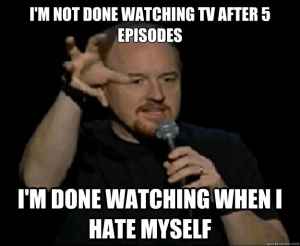
Think about the television shows that are still on air that you watch. What keeps you watching? The acting? Your attachment to the characters? The music? While some of these things contribute to your love of a show, it is instead that if you stopped watching, you would miss out on the inevitable cacophony following every new episode. We are entering the era of must-watch television, where we are not only watching each episode with our friends or family, but connecting with millions of people across the world. Therefore, the more subtle character-development based era of Six Feet Under or Dawson’s Creek could never cut it among shows like Game of Thrones, Breaking Bad and so on. Therefore, a show is dependent on its “meme-ability”. Television and its reception is made and broken by the masses rather than those of the individual. With the emergence of Twitter, Facebook, as well as other sites like 4chan and Reddit, television is being constantly criticised and evaluated by a new audience.
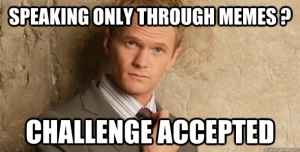
“Meme-ability” is essentially the ability, or rather the instant acceptance as a meme (albeit within a small group or cult) of a television show. According to Richard Dawkins, who coined the term in his 1976 book The Selfish Gene, a meme is any “unit of cultural transmission”. In other words, a meme can be anything which is passed from one person to another, whether it be an idea, a behaviour, a quote or so on. The common misnomer is that memes are just pictures passed around and replicated via the internet like the one below. While this is definitely essential to what such a concept means today, the first definition still holds weight. However, internet memes (which have been around since 1996 with a .gif of a computer animated baby dancing cited as the first one to become popular) is broadly anything that goes viral and consequently slowly becomes forgotten. The majority of these, however, or at least those taken to be called “memes” are simply a still picture (or sometimes .gif) with two blocks of text on the top of the bottom of the picture. Well-known memes are LOLcats, FAIL, “One Does Not Simply…” and “Not Sure If…”, and while they display an innate disrespect for spelling and grammar, they display the way that memes are changing the way we speak to each other, as well as how we may sell these shows. For example, the Facebook page for Showcase almost exclusively markets Game of Thrones with memes, attracting thousands of likes and shares. However, hearing people use the word “Hashtag…” or “Doh” is not going to become a part of the accepted formal language (or at least, I sincerely hope not). Memes such as this only add to the slang we put on around people we are comfortable with. The days where speaking only in television quotes are a long way off yet, but memes are a part of our culture. They are a new language, to be used within a new interpretative community of the television to come.
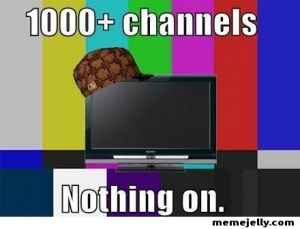
Amongst today’s era of video-on-demand consumption within the online-centric, lazy culture, television shows or networks are in a constant contest to be noticed and watched. This means that it is often hard to know what to watch next. Consequently, the instinctive thing to do is to look at what is most popular and follow the “hype” surrounding a new series. In terms of a television show, its “meme-ability” can mean it is either a defining shocking moment of an episode or to make something funny. The former is more what is meant by the term “meme-ability”, wherein a show’s power is to be found within its ability to shock its audiences. Therefore, the fact that something “cool” or controversial is more important than the actual event or happening. While it is important to keep viewers watching, in a world where there is instant conversation during an episode, the paramount aim of the creators and writers is to keep everyone talking.
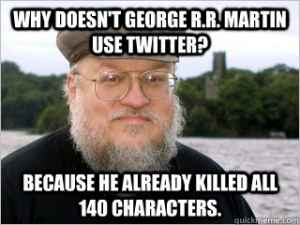
The saying “No publicity is bad publicity” is truer now more than ever when applied to television. For example, looking at the recent How I Met Your Mother finale backlash from the majority of people on Twitter, for those already committed to the series, they are spurned on to see how bad or disappointing it is, as are those new or interested in the series. Therefore, social networking sites offer a two-pronged approach, to reflect responses back to the creators to refine the show, but more importantly to create a “buzz” or “hype”. This is the age where reviews do not necessarily matter, as long as there is extreme love or hate for a television show, it will be watched. To view a television show is not an insular experience any more, there is not only an expectation, but a need for comments to continue to keep a show afloat. What were once novelties where you can post or “tweet” about your eating habits are now legitimate ways to market a show, as well as forums for responses. However, not everything that is posted or “tweeted” should be taken at “face value”, as it is often exaggerated to be read. Similarly, every program must be seen as having been gone through a filter of hyperbole or forced “meme-ability”.
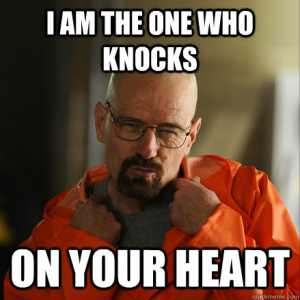
The majority of what is known as “event television” has an element (or several elements) which are exaggerated to the point where the audiences are left incredulous. This could be the amount of violence, sex or profanity, pushing the character traits to the edge of their humanity. While the physical actions of the characters are still important to a program, there are lines which have become indelible in our minds. A perfect example is the “I am the Danger!/I am the one who knocks!” meme of Season 4 of Breaking Bad, which perfectly expresses that characters are exaggerated almost to the point of ridiculousness. Therefore, melodrama is not only part of the soap-opera genre, but emerging into prime-time television. This is not a criticism or a step backwards for the medium, but an opening of a world without constrictions on where expectations can be met. Television is the medium where expectations can be broken and constantly heightened. It is not a privileged experience anymore, with the use of torrents or other routes of access, anyone can watch any program.
The recent Season 4 premiere of Game of Thrones broke the record for the most pirated episode ever, with Australia leading the way. Despite the subscription service Foxtel showing the episode only hours after HBO, 11.6 per cent of all illegal downloads came from Australia. This only further highlights that television is not about the inherent pleasure you get from the show, but about being part of the discussion during the airing of a television show. With the emergence of actors or writers “live tweeting”, as well as using hashtags, there is no end to the possibility of a program’s popularity. Yet, the question to ask is: Why are people downloading television shows? Would they pay for it if it were more readily available? The answer would probably be no. If there is always a easy way to access something for free, the majority of people will use that way.
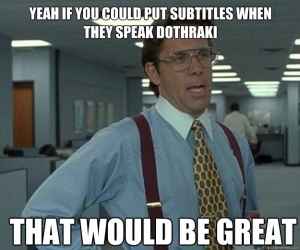
In addition, if we are unsure whether our money is going straight to the creative team or actors (which it, for the most part, is not), we are not going to pay for it. Unlike paying for something like an album, we are paying for a service when subscribing to a cable station or pay-tv broadcaster. Rather than paying for individual episodes or seasons, the fees go towards other programs which we may not even watch. The growing need for selection between the multitude of programs out there is hindered by the growing unavailability of instantaneous access. Therefore, there should be a revision of the on-demand landscape, wherein services such as Netflix or Hulu are made more readily available, as well as making cable stations releasing episodes individually for a small cost everywhere, rather than locking up shows in exclusive contracts. Just because something is the “best” show now does not make it the only show worth watching for the foreseeable future.
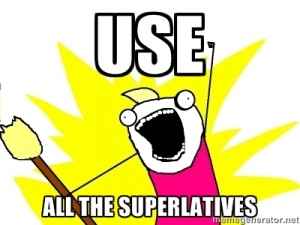
Superlatives (phrases like “best show ever”) are the bread and butter of criticism. Just looking at the IMDb comments and other reviews for Game of Thrones, there are a majority of people giving it 10 stars and calling it the best show ever. This signifies that the extreme measures which are necessary for a show to become a meme aim intrinsically to “blow the audience away” by completely distinguishing it from other shows. In order for a comment to be listened to, there needs to be a certain hyperbole added. People do not want to hear how some parts are good and other parts have flaws. They want to hear how utterly awesome and “unlike anything else on T.V.” it is. In a market where thousands of television shows are available at once, the best need to stand out. Therefore, a certain meme veil is placed over it, wherein the viewers only focus on the shocking or “awesome” parts of the show while subconsciously ignoring the clichéd or boring parts. This, however, can only last so long.
There is ultimately a cyclical nature to the popularity of a show, a point where the surprise of a show’s shock value wears off and you see how similar it is to everything else (at least in terms of using clichés and typical plotlines). For example, the United Kingdom’s Channel 4’s Utopia (which is soon to be remade by David Fincher for HBO) shrouds itself in mystery from the get-go. The repeated line “Where is Jessica Hyde?” is written to become a hashtag. The appeal of the show is dependent on not knowing what is going on or what motivations people have. Once the mystery is revealed, you realise that it is just another conspiracy theory (albeit extremely well-made) thriller. Therefore, the meme-ability of a show is about getting their foot in the door and instantly connecting to its easily persuadable audience.
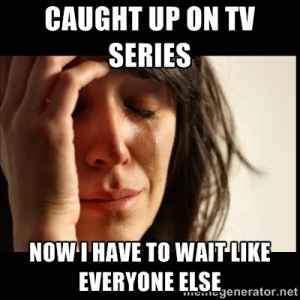
The world of modern television is all about talk and a show’s continuance is based on the sustenance of a “buzz”. This means that the creative teams behind shows force controversial or extreme violence, sex or profanity. Consequently, character traits of “event television” are often exaggerated to the edge of unbelievable lines or actions. The increasing use of torrents and other services to illegally download or watch new television denotes that the immediacy of response from viewers is paramount. The use of mystery is used to create a meme, so that people can call the next show the “best ever”. Ultimately, every decision concerning a television show is made to incite a “hype”. However, this is not to say that every show is engendering hyperbole. There is an exception to every rule. While the rush of “event television” has moved television from an activity taken for boredom-satisfying to a socially accepted and entertaining art form, it still restricts characters and plotlines to obvious routes. It is us, the audience, who hold the real power over where television will go from here. The recent shows of the past decade or so have widened the boundaries about what can be shown and accepted. Now we can apply these innovations to different situations. As more people are entering the world of social networking, the power is moving from the creators to those who are watching.
What do you think? Leave a comment.











“SURPRISE, MOTHERFU*KER” still makes me laugh. RIP, sweet Doakes.
Gotta love the Doakes memes.
Wow great writeup! I remember for a number of years ago, I tried to explain to a peer of mine what a meme was- this was before the entire internet were engaged in it. Trying to explain it was one difficult task.
Thank you! It will only become harder and harder as they only become weirder. One need only look at the “Shrek is Love, Shrek is Life”. That alone merits an article exploring the strange entertainment people get from watching messed-up things.
“As more people are entering the world of social networking, the power is moving from the creators to those who are watching.” I think this is an important piece. We’re entering an age of user content that far outweighs the content of an official creator. Even with something as well written as Breaking Bad, much of the show’s massive appeal stems from its social media interest.
Thank you for commenting, Nilson. Completely agree.
I would also have to agree with the claims in this article. I think you have a point; social networking is quickly becoming the method of communication with the most gravity invested behind its users. A show could be a masterpiece in itself, but ultimately, the raw influence of social networking behind powerhouses such as Twitter could put remarkable dents in the reputation of any show. In regards to the illegal download of television shows, I don’t believe much can be done in terms of making these episodes more readily available or cheaper upon their releases. If they decided to lower the prices to account for the business they lose to illegal pirating, they would have nothing to gain substantial enough to make the decision worth investing in; it might only appeal those who enjoy a show just enough to pay for a cheaper deal. Generally, it is simply that too few people are willing to pay for something they can get for free. It has become instinctive for modern, tech-hungry generations to obtain the things they want for the least cost to them, and in this case, the internet has become the most efficient way to get virtually anything for free. There simply is not an incentive strong enough to account for general audiences to pay for their favorite shows when it is so readily available minutes after it premieres on television, apart, of course, from the most dedicated fans. The generation of profit is more literally in the hands of the people who enjoy a show and its creators enough to support them by paying for their works.
Definitely agree with your second point concerning illegal downloading. I just did not really want to sound like I was advocating a stance that paying for television is right. However, I do not see any drastic changes in the near future in this area. While I do not pay for television, I would pay for a box set for future watching.
All I was saying that it would be proactive to at least propose some sort of try-before-you-buy service similar to Spotify or Youtube for music. While this may apply to services like Netflix, they are not available everywhere (I specifically live in Australia). However, if there is a relatively easy way to get TV for free, people will keep using it. That is a harsh truth, so perhaps the creators should look for profit-making ways other ways.
Anyway, thank you for commenting.
Not really a fan of memes even though, more often than not, they are spot on and hilarious. Good Article.
Thank you, Jeremy.
Futurama’s “Shut Up and Take My Money!” is a very good meme, although I suppose it doesn’t really change at all.
Most of them don’t really change
The South Park meme always has that character’s voice in my head when he says it. I don’t want to have a bad time.
So how do you think things like Netflix Original series, that release entire seasons at once, fit into this trend? Discuss.
Geez, ok, I’m not sure by saying “Discuss” you want me to write a long essay-like answer to this, but I will try my best.
First off, I live in Australia and therefore do not have access to Netflix, so I am not extremely knowledgeable in everything to do with the service. However, I have watched one Netflix Original series (that being House of Cards), via other routes, mostly on a site called TubePlus.
Yet, I think that the fact that Netflix releases a season all in one go feeds into the “we want it all and we want it now” sort of consumption. People can not wait and if they do not have to, they definitely will not. I, myself, am a binge-watcher, not necessarily to the point where I will finish a whole season in one sitting (or even one day), but still I am never satisfied. As soon as I complete a series, the search for another begins. Consequently, the fact that everything is there and easily accessible would support this constant hunger.
As for the meme-ability of Netflix shows, I can really only comment on ‘House of Cards’, which was for the most part exaggerated beyond belief. However, as a whole, it was a slow-burning series. While there were some jaw-dropping moments and lines, they were few and far between, especially in the first season. It was more about the behind-the-scenes clockwork of politics. In the second season, stuff from the first season added to the fire of the second and more big events started to occur.
But as series like ‘House of Cards’ and ‘Orange is the New Black’ begin to pick up steam critically across the general television watching community, Netflix will try and push their way into the mainstream consciousness. This will mean more drastic, exaggerated storylines. Just looking at the next season of Season 3, advancements in Season 2 will definitely come to bite Frank on the ass, and it may all start to fall down in a ‘Breaking bad’ sort of way.
Personally, I am not an advocate for the release of an entire season at once. Television has been based on the idea of a weekly episode since the inception of the series. When you watch several episodes at once, all the actions just seem to blur together. You stop paying attention on the specifics of what the characters are saying, but just focus on what is going on. Eventually, nearing the end of a season, your brain just goes on auto-pilot, because you just want to say you have finished. But that could just be me.
Also, in terms of artistic evaluation, when you release all the episodes at once, what is it asking you to do, to evaluate the season or each individual episode. While it may be best, in terms of going over each scene to see if you understand the motivations and the feelings of each character, you are often spurned to just keep watching. Therefore, television series just become really long films. The break between episodes does not really mean much in terms of deriving meaning, it is just another short break in the story. Episodes, or at least the best episodes of a television show should revolve around a specific theme or character. However, shows are now just continuous serialised art forms. I am not saying that there is anything necessarily wrong with that, but television should not forget that it came from a place where suspense was held, not avoided.
But, we are living in a media world where because there is always something out there for us to consume, we will never be satisfied. It is not like the early days of television where you sat down to watch your favourite serial every Saturday night and then had to wait until the next week and that was enough for you. You had that week to speculate on what would happen next. Now, we may have several television shows on the go at the same time. Because of this saturated world of on-demand video, television series, even shows which people are paying for(like Netflix) need to stand out from everything else.
If Netflix wants to truly expand, they better strike while the iron is hot and try and get markets in other countries. However, not everyone will use it if they can just look up the series after it is released.
In brief, the trend of releasing entire seasons at once is, as far as I can see, not going to be a temporary thing. While it may be a detriment to the old ways of watching television, as well as a detriment to the normal artistic evaluation of a series, it is a necessary advancement in a world we need as much as we can consume as soon as we can. This means that the meme-ability will only increase if whole seasons are released, as it is not just a question of which episode will I watch first, but which season.
I think memes lead people to a false hope of who they would like to be. I only watch TV for artistic expression. Very little falls into works of art, maybe Dowton Abbey, Game of Thrones, not much else would keep me interested enough to schedule my life around a TV show
While I think television as art is the ultimate goal, it is becoming less and less achievable. Believe me, you do not want to become a television watcher.
Artistic television shows need to make money to be made. Hence the problem 😛
Precisely
I like the article, but I think I like your follow-up even better. I did not know the origin of the word “meme”, so that bit was especially interesting, particularly regarding the fact that its definition is so broad. In your reply to Sam, however, I’m really glad you touched on what TV “used to be” (although it makes me feel kind of old, even as a college student), because I have recently been wishing for the once-a-week kind of experience. I watch a few shows on Netflix and Hulu, and though I haven’t torrented or otherwise illegally downloaded anything personally, I have watched movies “stolen” by friends and have very mixed feelings about it; music, too, BECAUSE of the artists. As an artist in several mediums myself, I shudder to think that at some point artists will cease to be recognized for their art. While I don’t think I could say “television as art is the ultimate goal,” I do recognize the artistic element to all shows, at least at the beginning. The film and TV show industry has an inevitable ability to corrupt, I think, like “regular” politics, but I suppose that’s another issue.
I also liked what you said about PR: “This is the age where reviews do not necessarily matter, as long as there is extreme love or hate for a television show, it will be watched.” As an aspiring novelist, the idea of reviews functioning in this way kind of scares me, but maybe the two (TV and novels) are not so related. In any case, I think it’s true, and perhaps it’s not such a bad thing. I think stirring up controversy, at times, is good, but I wonder if the moral aspect of this type of review process–“hype” and all that–is something we should reassess as a community of film- and television-watchers.
Thanks for commenting! Music is an industry where it may be more obvious about where the money is going (especially in independent music). When I said ‘television as art is the ultimate goal’, I meant that all art (including television) should aim to express itself freely irrespective of any commercial interests. Of course, art has blended with entertainment and thus, commercial interests come into the foreground, which is essentially the basis of the need for ‘meme-ability’.
As for your comment of PR, I don’t think it should be seen in terms of morality. I mean sure, there are smaller shows that are left in the wake of those which have hype, but ultimately, it is a business, and it is whoever can push their way through the door will be watched. Mediocrity just doesn’t cut nowadays in the world of art. Reviews are just another gateway. In my opinion, people won’t take much notice of reviews. If they see 5-stars, they think that it is good, without relating it to their own tastes. Hype is a necessary evil, I think. The end which should be reached is a world where hype is mixed with true, unbiased evaluation, where recommendations are made with just the right amount of unfounded enthusiasm.
Yes if HBO would use Go app like it should function, like a streaming service, I would gladly pay their subscription but I don’t have cable and don’t have a way to get HBO besides that. Bottom line is you must have cable to get their stuff so create another outlet something like Netflix has and I bet that would bring in a lot of people.
HBO has made a massive name of itself in quality television and if they can follow the trails of services like Netflix or Story Sync etc., they can solidify their fan base for many more years.
This was a really interesting article, I mean, we don’t really think about the impact or even the emergence of these trends until well after they are established. Very though provoking!
Thank you, Kathryn!
Made me think about memes and the impact they have on us. Sometimes I don’t believe they’re a successful trend, but oh well.
Depends what you mean by successful, while I do not think that I wanted to focus on the general understanding of memes, they are not going to hang around forever I don’t think, but they will have a lasting impact on popular culture and how we speak to each other. Thank you for commenting, anyway.
Television has never been about the individual, though. I’m not sure what you’re imagining, but television has petty much always been about ratings and mass viewership. The internet and the increase in channels and well-made content is fracturing the audience, dividing the savvy, internet-using audience and the traditional, CBS-leaning audience on the other hand. Buzz does not automatically generate success; Community just got canned, all kinds of garbage sitcoms nobody talks about online live on.
I would also disagree with your premise that Dawson’s Creek and Six Feet Under were subtle; rather, they were episodic. They were slow on character development not because they were invested in honesty, but because they aired during a time when it was still important for episodes of a television series to maintain viewers who might watch sporadically rather than weekly. Dawson’s Creek thrived on melodrama that went nowhere and meant nothing to fill episodes; the melodramatic elements of, say, Breaking Bad, always further the central narrative. Episodic series aren’t automatically bad, but I wouldn’t say they are more subtle or character-driven than serial shows.
Thankyou for commenting. First of all, I would just like to reiterate that I am not from America, but rather Australia. Secondly, I am relatively new to the analysis of television, I am not extremely well-versed in every show or American television practices, and for that, I am sorry. I am merely saying that even if television has always been about ratings and mass viewership, it is becoming more about inciting a mass response. I agree with your comment about the divisive nature of the internet. I can not necessarily speak towards Community, or how popular it was. We are potentially entering a future where so-called “garbage sitcoms” could be forced off the air by popular support.
To be honest, I have never seen Dawson’s Creek, and did not watch Six Feet Under in its original run. However, to call Six Feet Under episodic is only partially true, while each episode did revolve around a theme, there was always some continuing thread. I think we are entering a time where the ‘central narrative’, as you call it, is what is drawing people in. I do not believe that episodic series are intrinsically bad, but they just don’t really do anything for me, bar Seinfeld. I like shows that mix both episodic and serial elements, and I think that serialisation is becoming more and more attractive to people, as television is more than just a form of escapism, but a way of interacting with an art form across several platforms at once. I know this article may appear highly speculative or presumptuous, and I am sorry if you disliked it.
‘Sad Don Draper’ is so damn funny.
This is quite a time capsule from seven years ago.